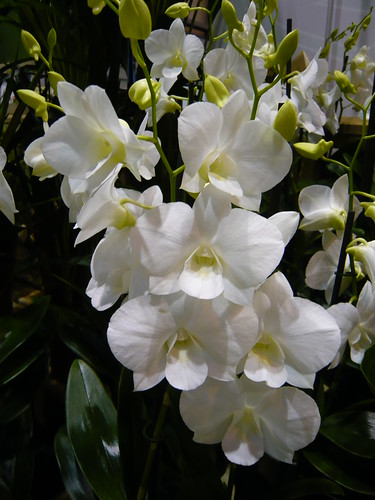More Phalaenopsis Moth Orchids
It is easier to call a Phalaenopsis by its common name of Moth Orchid

This moth orchid (called Phalaenopsis) is blooming for a second time this year and the last blossom lasted over 5 months. On one arching stem there are 12 flowerheads and one unopened bud but there is also 4 other stems at different stages of flower production and at least 25 2½” diameter flowers are currently on display. This floriferousness may be due to a happy accident after the first (and only) stem flowered I followed received wisdom. I trimmed off the spike to around 1 inch above the first node on the spike stem, somewhere below where the first flower had appeared, near a little bump. The stem regrew but horizontally and I wanted to tie it up a cane. Being too vigorous I broke the new flowering stem but all the new ones have turned up at the funeral so to speak.
Moth Orchid Growing Tips
- A moderately bright windowsill will help your Phalaenopsis to reflower and the flowers can last several months. Start with a plant that has lots of buds.
- Do not be afraid to cut off flower stalks to get new growth as blossom dies.
- Moth orchids prefer dappled light sun burns and turns leaves yellow.
- Watering when it begins to dry out, about 10 days. Do not use cold water or allow water to stand on leaves or roots to be water logged.
- Use high potash fertiliser or fertilizer made for orchids and keep temperatures above 58 F.
- Repotting when the bloom is finished with fresh orchid mix but do not be in a hurry with mature orchids
- I give my Orchids regular neglect and they seem OK.
Phalaenopsis Roots
Roots are more important than leaves for the health of your Orchid.
A good orchid requires a strong root system.
Good roots need access to air, in the wild the plants are Ephites that hang from trees. Give roots a very open orchid growing medium. I add coarse bark.
Younger Phalaenopsis typically thrive on repotting as it stimulates root growth.
Orchid compost is available from Amazon



2 thoughts on “More Phalaenopsis Moth Orchids”
Comments are closed.